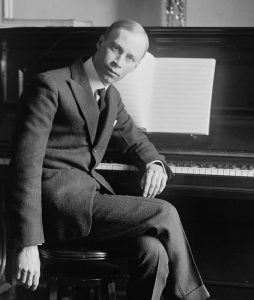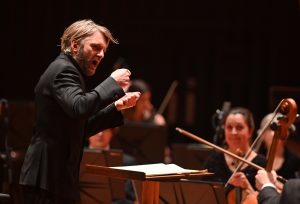Sergei Prokofiev was born in Sontsovka, a rural village in the Donetsk district of eastern Ukraine, where his father managed the large Sontsov estate. It’s an area that I know well: my father [ed. the celebrated Ukrainian composer, Ivan Karabits] grew up in the region, and it is where I was sent to stay with my grandmother following the 1986 Chernobyl disaster, as it was deemed safer than Kiev at that time.
The Prokofiev family lived in Sontsovka until 1910, when the young Sergey was 19. He’d already left to study in St Petersburg by that time, but was still returning home during the summer breaks. It’s also where Reinhold Glière taught him composition and piano.

Sergei Prokofiev at his piano
The child prodigy Prokofiev wrote a lot during these early years, including an opera at the age of eight, and by the time he was admitted to the St Petersburg Conservatory several more had taken shape. In my view, this early chapter of Prokofiev’s life is yet to be properly explored. Everyone thinks of him as a multifaceted character of extremes, subject to the external forces of the decades he lived through. Of course he was all of that, but if you look back to the early years in Sontsovka you can see his musical language developing right there, and it’s where his talent developed into the style that we love today. His enduring influence on film and TV composers has meant his musical language has spilled into the public consciousness, however, his better-known works have overshadowed some excellent music that deserves to be recognised.

Chief Conductor Kirill Karabits (c)Mark Allan
I was pleased we were able to include some of the lesser known early orchestral works in the cycle we recorded for Onyx, such as the Autumnal Sketch (1911), Symphony Fragment (1902), and Dreams Op.6 (1910). Generally, his musical language isn’t actually all that easy to crack; of course he was connected with his contemporaries, but the ways to interpret his music differ from other styles. I feel that we achieved this with those recordings, and the Orchestra truly committed to the journey.
Whilst I remember playing his piano sonatas when I was young, I was always slightly afraid of Prokofiev’s music as a child. It requires such a high level of technical ability. Played well it’s incredible, but anything less than perfection and it loses everything.
At its best it is music that makes your brain explode! It requires a lot of responsibility compared to a composer like Mahler, who gives you so much direction in the score. Prokofiev makes you feel like a composer, with the freedom to work it out as you go along. Another composer who does this is Terterian, whose Symphony No.4 is written without bar lines! In many ways this approach that both Prokofiev and Terterian take is liberating; it’s as though they’re saying ‘I need you in order for my music to function’.
The house where Prokofiev grew up no longer exists, but the church where he was baptised is still there and the school has been recently renovated; I really hope to visit later this year.
You can hear Prokoviev’s Autumnal Sketch in our concert on 6 October, Symphonic Pictures.
To read more content like this why not consider becoming a BSO member? As part of the membership you’ll receive our Quarternote magazine three times a year, which is full of exclusive content and behind the scenes news. For more information about becoming a member click here






